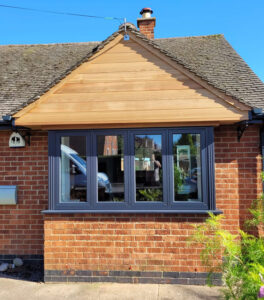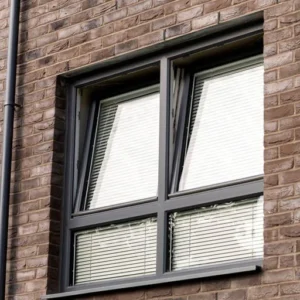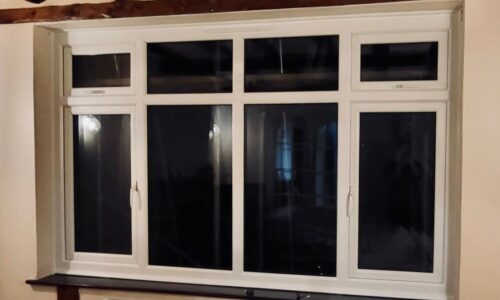What are uPVC Windows?
uPVC windows have become the go-to choice for modern homes since the 1980s due to their increased durability, cost-effectiveness, and lower maintenance requirements. uPVC, which stands for unplasticated polyvinyl chloride, has many benefits over traditional wooden frames, particularly when it comes to longevity. You don’t have to worry about them rotting or flaking and they don’t need frequent new coats of paint as they withstand more wear and tear. Plus, they come in various styles and finishes, so they can fit right in with any home design.
Whilst uPVC windows are a much easier alternative for many homes, it is still important to understand the best practices for their maintenance and cleaning so you can get the most out of them. In this guide, you will learn all you need to know about your uPVC windows to make sure they benefit you for years to come.
How Long do uPVC Windows Last?
One of the best things about uPVC windows is how long they can last if you take good care of them. On average, you can expect them to last around 20 – 30 years, but with the right upkeep, this could be extended further.
What Causes Damage to uPVC Windows?
There are a few things to watch out for that can cause damage to your windows:
Weather Conditions: Depending on where you live and the weather conditions you typically experience, the durability of your windows can be affected. Consistent exposure to harsh weather like strong sunlight, heavy rain, or extreme temperatures can slowly break down the uPVC material, which may make it less effective over time.
Physical Damage: Impact damage can cause damage such as chips, cracks or even breaks. This could come from weather such as hailstones or debris caught in strong winds, but can also occur from rough handling of the windows.
Poor Maintenance: Skipping regular cleaning can lead to a build-up of dirt and grime, which will not only affect the appearance of your windows but may negatively affect their functionality. It is important to inspect and maintain your windows as part of any regular cleaning.
Faulty Installation: If the windows weren’t installed properly, you might face issues like poor insulation, water leaks, and trouble with how they open or close. This can lead to further damage down the line. If you’re in the market for new uPVC windows, then make sure you look at reviews and testimonials to ensure you can trust the quality of the company you are using.

How to Clean uPVC Windows
Knowing how to keep your uPVC windows clean will help avoid some of the potential damage that can occur. Regular cleaning also allows you to catch any other issues before they become larger issues. Here are 6 easy steps to ensure a clean and thorough cleaning of your windows:
- Gather Supplies: You’ll need a soft microfibre cloth or sponge, a bucket of warm soapy water (mild detergent is best), and a non-abrasive cleaning product. Any typical window and glass cleaner should do the trick, but check the labels to be sure and Steer clear of harsh chemicals or abrasive materials to avoid damaging the uPVC surface.
- Dust and Debris Removal: Start by wiping down the window frames with a dry cloth to get rid of loose dust and debris.
- Clean the Frames: Use your cloth or sponge and place it into the soapy water. Then gently clean the frames, making sure not to miss the corners or edges where dirt can usually gather.
- Rinse and Dry: Rinse the frames with clean water to wash away any soap residue, then dry them off with a cloth to prevent water spots.
- Clean the Glass: For the glass, apply the glass cleaner (or a mix of vinegar and water if you prefer a homemade solution) to the window. Next, wipe down the glass with a microfiber cloth for a streak-free shine.
- Lubricate Moving Parts: Every now and then, put a little lubricant on the moving parts like hinges and locks to keep everything working smoothly.

When Should You Replace Your uPVC Windows?
Despite their durability, there will come a time when you need to think about replacing your uPVC windows.
Damage: If you notice visible damage like cracks or warping, or are having any trouble with the function of your windows, such as how they open or lock, it is worth looking at getting new windows installed. Another possible form of damage that might require a new window installation is if you find condensation between the glass panes, as this can mean the seal has failed, affecting the insulation.
Increased Energy Bills: A more subtle sign that it might be time to replace your windows is if you notice higher energy bills, as this could also be a clue that your windows aren’t insulating as well as they previously have (of course, factor in current trends in energy pricing into your analysis).
Design: Finally, if your windows just look outdated and you are looking for a potential renovation, new ones can freshen up your home’s look and also boost its value on the housing market.
By keeping your uPVC windows clean and giving them a bit of regular maintenance, you can enjoy their benefits for a long time. But when the signs of wear and tear start to show, replacing them will keep your home energy-efficient, secure, and looking great.
At Southworth, we are the window supplier of choice in the Loughborough area and have built a reputation of excellent products matched with incredible customer service. If you’re in the market for new uPVC windows and are interested in a free, no-obligation estimate of your home, then contact us or visit our windows page to learn more about the different styles of uPVC windows we offer.
Posted in Latest News
